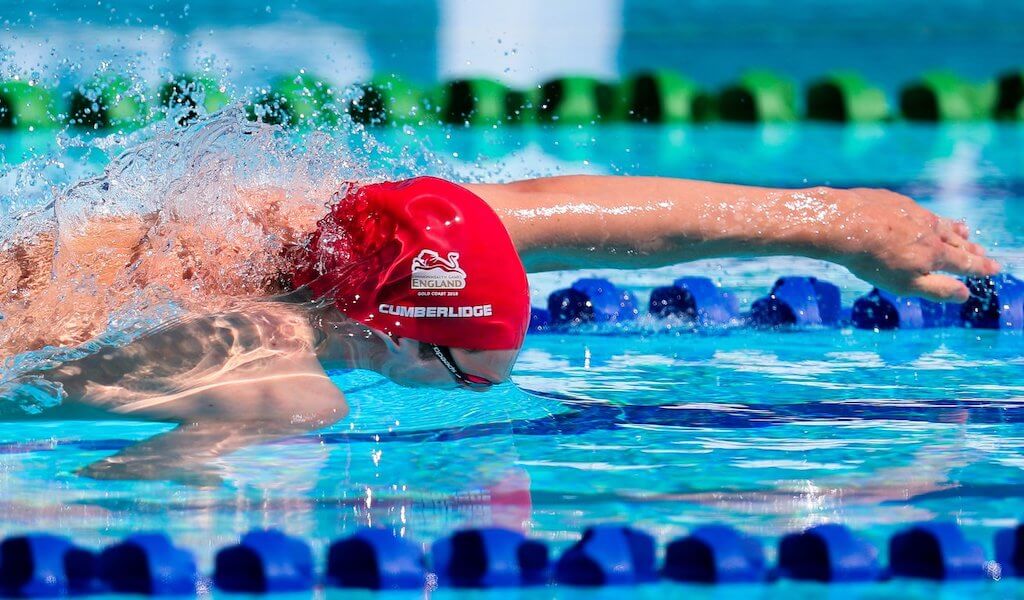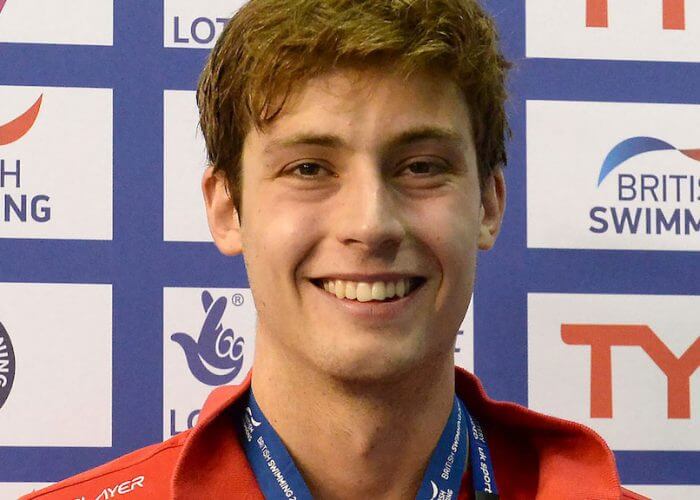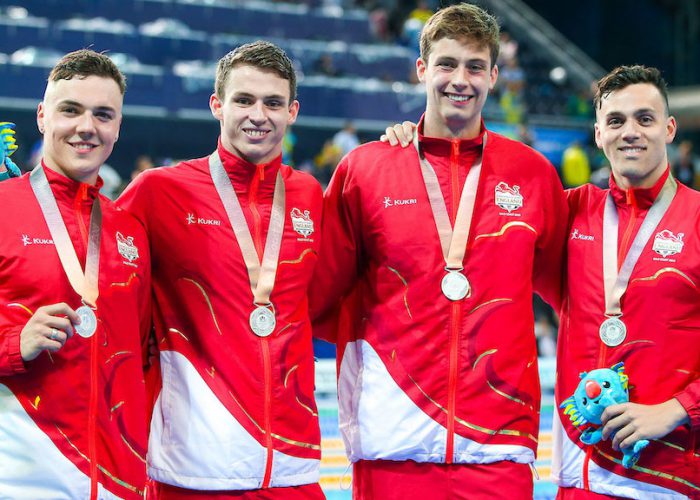Britain’s David Cumberlidge on Swift Ascent Up Worldwide Sprint Ladder

While David Cumberlidge may not be a household name in the sport, nor attract the same social media following as the likes of Florent Manaudou quite yet, his rapid ascent within the swimming world has been nothing short of impressive.
Standing at 6´7”, Cumberlidge is an instantly recognizable figure behind the blocks, his physical attributes perfectly suited to sprinting. Currently the fourth-fastest 50-meter freestyle swimmer in British Swimming history, Cumberlidge is sitting just .01 behind former world-record holder Mark Foster. However, while his height and wingspan are not altogether uncommon among 50-meter specialists on the world stage, in an event synonymous with aggression, Cumberlidge is a far more shy, reserved character, bringing a calm personality to poolside. Rather than the showman persona associated with sprinters such as Gary Hall Jr., he favors a reasoned, even methodical approach to the sport of swimming.
Given his speed through the water, it would be easy to assume Cumberlidge followed the typical route as a youngster, following the little black line on the bottom of the pool for hours on end. This blueprint has, after all, provided the foundation for many world class athletes, yet Cumberlidge has an altogether different story underpinning his success.

David Cumberlidge – Photo Courtesy: British Swimming – Richard Blaxall/SWpix.com
His time in the pool as a junior was short-lived, as Cumberlidge turned his back on the sport at just 14, after only six years, frustrated by his lack of progress and inability to compete within his age group. Despite his initial struggles, three years later, at 17, a comeback began. Cumberlidge rejoined his childhood coach, Mark Seymour, swimming four times a week with Tynedale ASC, but with no intention to ever return to the sport competitively. Seymour, still the head coach of the small local club, fondly remembers welcoming Cumberlidge back to the pool, watching in awe as he pushed a sub-25 second 50 freestyle during his first session in the pool, after his three-year break. Little did swimmer nor coach know, this was the start of an upward trajectory that would result in two Commonwealth Games medals just four years later.
“I stopped swimming when I was 14,” Cumberlidge said. “I felt like I wasn’t getting anywhere in the sport and all the other guys were so much faster than me at the time. I had a strong urge to try swimming again when I was 17 so I got in contact with Mark and asked if I could come down and try a few sessions. At the time I didn’t have any plans to race competitively. I only wanted to swim for leisure”
Between the ages of 18 and 23, Cumberlidge lowered his 50 freestyle time from 24.61 to 21.97, while his 100 freestyle fell from 55.07 to 48.76. Although Cumberlidge admits that he fell into the 50 freestyle by accident, due to his physical attributes and lack of conditioning as a junior, focusing on the 100 freestyle was a far more deliberate choice. Cumberlidge confesses that with maturity, he began to view the 100 freestyle as a route through which he would be able to represent his country at the highest level. Although the 50 free is indeed an Olympic event, the 100 free opened up the possibility of relay swimming at all major championships.
“Because of the break I took as a teenager, I lacked the aerobic background needed for longer events,” Cumberlidge said. “As my training increased and I started to mature, I started to focus more on the 100 because it opened up more doors being able to race in relays and compete at the highest level.”
It was arguably his move to Edinburgh University in 2015 that facilitated this shift in focus toward the 100, increasing his training from four sessions a week to nine, and doubling his workload both in and out of the pool. Edinburgh University has traditionally been a strong force within the swimming world, historically battling the likes of Loughborough and Stirling Universities, maintaining their dominance within Britain over recent years through the likes of Commonwealth medalist Corrie Scott and 2016 Olympian, Nicholas Quinn.

Team England 4x100m free relay (l-r): Jarvis Parkinson, Ben Proud, David Cumberlidge and James Guy at the Gold Coast Commonwealth Games in 2018 – Photo Courtesy: Alex Whitehead/SWpix.com
Since his transition to the Scottish program in 2015, Cumberlidge has excelled, bursting onto the international stage in his debut season, less than two years after his return to the water, capturing a bronze medal at the European University Games, as well as taking gold at the British Summer Championships. One year later, despite narrowly missing selection for the World Championships roster in 2017, Cumberlidge impressed at the World University Games in Taiwan, solidifying his selection for the upcoming Commonwealth Games. It was then in Australia that Cumberlidge landed his first senior international medal, winning silver in both the 4 x 100 freestyle and 4 x 100 medley events. Unsurprisingly, Cumberlidge recalls these achievements as the current highlights of his blossoming career in the pool. However, after coming agonizingly close to the podium in the 50 freestyle, finishing fourth behind English comrade Ben Proud, Cumberlidge admits there remains unfinished business at the Commonwealth Games.
What is perhaps most exciting about Cumberlidge’s story is that he has shown no sign of plateau. Earlier this year, Cumberlidge became only the fourth British man ever to break the magical 22-second barrier while taking gold at the World University Games in Napoli, Italy. In the process, Cumberlidge continues to improve his chances of standing alongside European and Commonwealth Champion Proud on the Olympic roster next summer. His improvement over the last five years has solidified Cumberlidge as one of the most promising sprinters within Britain and one to watch this Olympic season.
“My goals for this season are qualifying for the Olympic games,” Cumberlidge said. “I am really enjoy swimming and would love to be able to train and race for as long as I can and potentially make a career out of this sport.”




Nice one Ally. Great to see you last year. Hope all’s going well out there.